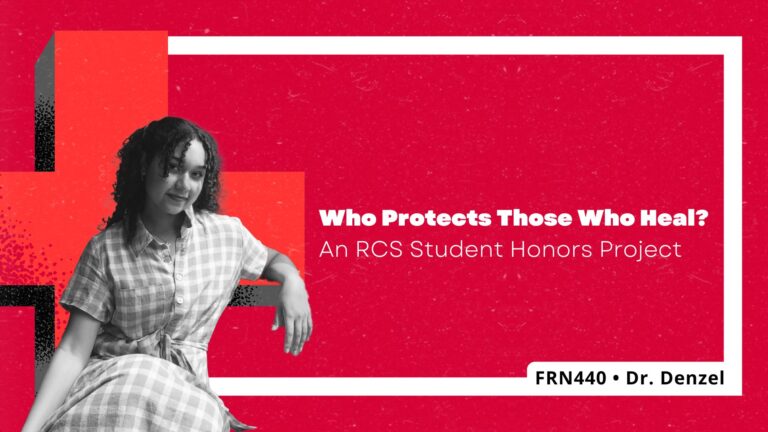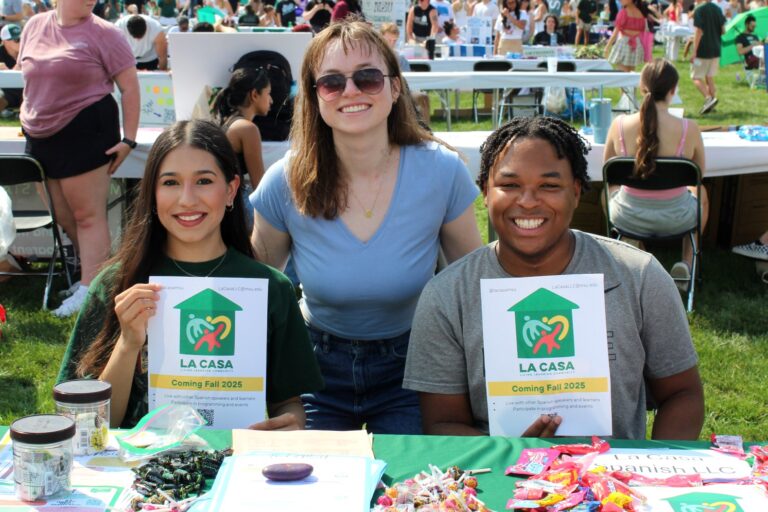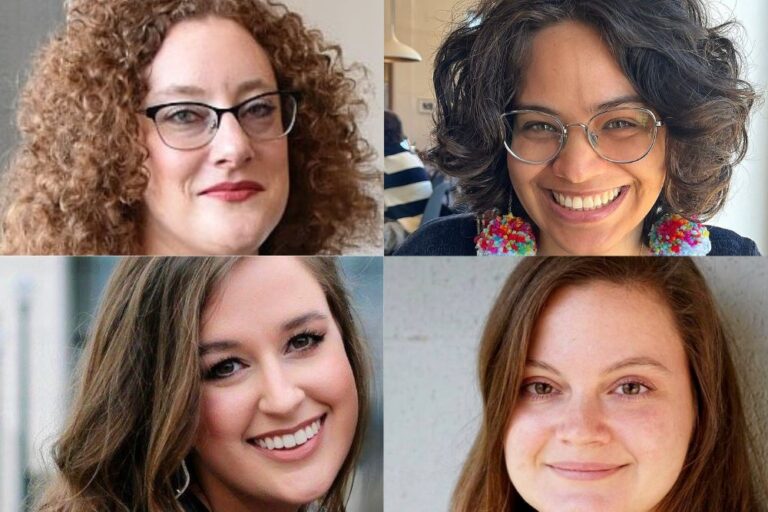As a recipient of the $25,000 Jeanne Marandon Fellowship, Hannah Olsen, a Ph.D. student in French and Francophone Studies in the Department of Romance and Classical Studies at Michigan State University, conducted research in France that she presented at the 2024 20th and 21st Century French & Francophone Studies International Colloquium and received second place in the Prix de Recherche.
A prestigious and competitive award, the Prix de Recherche recognizes innovative research that engages in important modern and contemporary debates in the field and that link to the theme of the colloquium, which was “independence” where authors were asked to explain how artists and intellectuals from the French-speaking world have expressed their independence when faced with the significant shifts in societies of the past century.
Olsen’s research essay, “Reproductive Independence After the loi Veil: The Legacy of the Fight for Abortion libre et gratuit in Agnès Varda’s L’Une chante, l’autre pas (1977),” examines how the legalization of contraception and abortion in France has impacted the lives of women in that country.

“Presenting at the 20th and 21st century colloquium was a great experience, and I was honored to get second place for the Prix de Recherche,” Olsen said. “For that presentation, I compared Agnès Varda’s 1977 film (L’une chante, l’autre pas) with archival footage of protests for reimbursement of abortion through social security (France’s universal health care program) and other narratives of abortion with certain scenes from the film…I argued that Varda’s film creates a convincing argument for why legal and free abortion was so important to women; it is a key family planning tool that helped them achieve independence in many aspects of their lives, especially in their roles as mothers.”
The loi Veil is the 1975 law that legalized abortion in France but legal and social barriers to accessing abortion and contraception remained and the 1920 law prohibiting the spread of ‘anti-conception propaganda’ remained in place until the early 1990s, thus contraception wasn’t encouraged and access to information about contraception and reproductive health wasn’t readily available.
“For several years after the legalization of abortion, women still paid out-of-pocket for the procedure. This essentially meant that, although abortion was legal, it was difficult for working-class women to access the procedure because they didn’t have the funds to pay for it,” Olsen said. “An abortion would have cost around 700 francs in the late 1970s/early 1980s, which would have been about one-third of a month’s wages based on the SMIC (salaire minimum de croissance or minimum wage) at the time. However, I’ve also read accounts of women paying much more than that for related tests, medications, and hospital fees if they had complications after the operation.”
“For several years after the legalization of abortion, women still paid out-of-pocket for the procedure. This essentially meant that, although abortion was legal, it was difficult for working-class women to access the procedure because they didn’t have the funds to pay for it.”
Judges for the 2024 20th and 21st Century French & Francophone Studies International Colloquium stated that Olsen’s essay explores “the lives of the film’s protagonists through their experiences with abortion, contraception, (single) motherhood, and infertility, underscoring the complex relationship between reproductive care and women’s independence after the legalization of abortion and contraception.”
Olsen was awarded the Jeanne Marandon Fellowship in Spring 2023. Offered by the Société des Professeurs Français et Francophones d’Amérique (Professional Association of French Professors in the U.S.), this fellowship is for students of French who wish to study and/or conduct research in France or Québec. Olsen’s research also was supported by a grant from the Center for Gender in Global Context (GenCen) at Michigan State University.
With support from the Jeanne Marandon Fellowship and the GenCen, Olsen traveled to France during the Fall 2023 and Spring 2024 semesters to conduct research.
In Fall 2023, she visited the François-Mitterand research library at the Bibliothèaue nationale de France (the National Library of France) and the Bibliothèque universitaire Saint-Germaine-dès-Près in Paris where she reviewed magazines, comic books, and self-published publications that were essential to her research as well as medical studies that relied on interviews with patients who sought contraception and abortion.

During Spring 2024, she visited the Centre de documentation du Planning Familial archives in Lyon, which has a collection of books, magazines, conference publications, and comics on abortion and contraception as well as letters the center has received from women about their family planning concerns, and the Centre des archives du Féminisme in Angers where she was given access to hundreds of posters; newspaper clippings; fliers; and pamphlets about abortion and contraception from the late 1970s through the early 1990s.
“I could not be happier with the research I’ve been able to accomplish this year,” Olsen said. “Not only was I able to access archives and libraries that are not available online, but I had the opportunity to network with academics, both French and American, who study French and Francophone history, culture, and literature while I was in Paris.”
Olsen has an M.A. in French from Michigan State University and a B.A. in Physics from Kalamazoo College. She also has a graduate certification in Women’s and Gender Studies from the Center for Gender in Global Context at MSU. She plans to complete her Ph.D. in French and Francophone Studies in Spring 2025.
Olsen has taught French courses at MSU in the Department of Romance and Classical Studies as a Teaching Assistant and, since 2017, has worked with a study abroad program in Belgium through MSU’s Broad College of Business. She also has served as an Academic Adviser to undergraduate Spanish and French minors at MSU.
“I could not be happier with the research I’ve been able to accomplish this year. Not only was I able to access archives and libraries that are not available online, but I had the opportunity to network with academics, both French and American, who study French and Francophone history, culture, and literature while I was in Paris.”
The 2024 20th and 21st Century French & Francophone Studies International Colloquium was hosted by Villanova University Feb. 22-24 in Philadelphia, Pennsylvania.
“I came away from the colloquium with an appreciation for the support I have had from the Société des Professeurs Français et Francophones d’Amérique and from my professors at MSU to study abortion, contraception, and family planning,” Olsen said. “In meeting and discussing my research with others in the field, I realized that not everyone has that academic freedom because abortion laws vary so widely in the U.S. Even though in my research I study quite nuanced narratives of abortion and contraception (including narratives of women who were practicing Muslims and Catholics who got abortions), if I were studying in a state that had more restrictions, my dissertation might have been very different.”
Vanessa Weller, a Ph.D. student and Teaching Assistant in French and Francophone Studies in the Department of Romance and Classical Studies at MSU, also presented a paper at the colloquium. Her paper, “Women’s self-determination in Márta Mészáros’ Adoption and Agnès Varda’s Vagabond,” analyzes the “perception of the non-conformist woman and her motivations through a comparison of the female protagonists Mona in Agnès Varda’s Vagabond and Kata and Anna in Márta Mészáros’ Adoption, specifically how her ostracization from a male-dominated society brings about the impetus to create a niche for herself, the dynamic of female-centered friendship, and the inherent dangers of a woman who knows her own mind.”
During the colloquium, Olsen and Weller served on a panel together, along with Marie-Claire Barnet from Durham University in the UK, in which they discussed Agnès Varda and her work.


